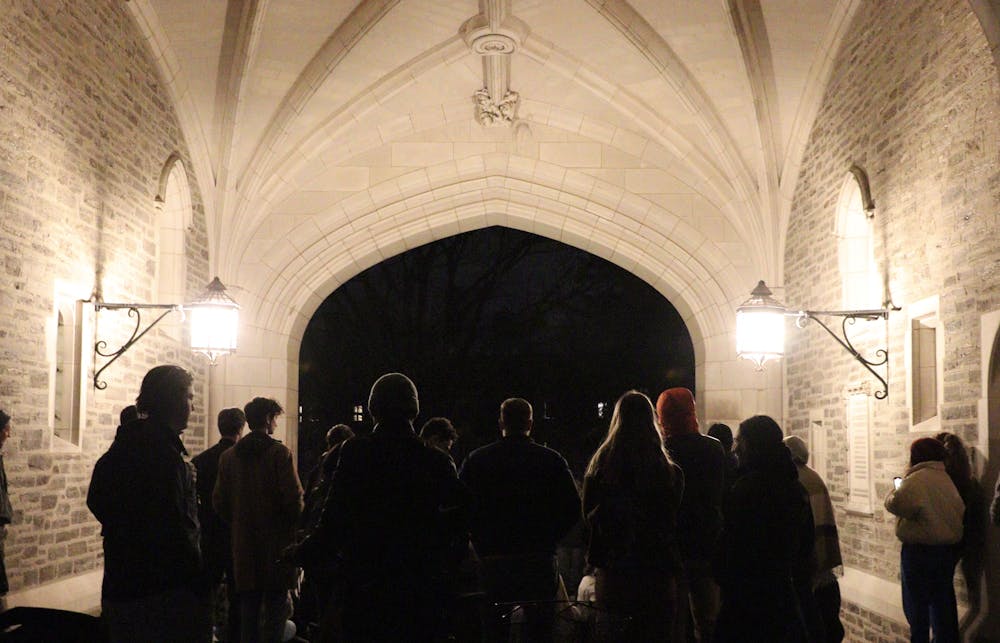A cappella groups have been ubiquitous on Princeton’s campus for decades, with auditions typically occurring during the third week of classes. The process, which takes place over multiple days, is exhaustive for prospective and current members alike.
Fifteen total a cappella groups are split into “Acaprez,” which is composed of eight presidents of the Footnotes, Tigerlilies, Katzenjammers, Tigertones, Tigressions, Roaring 20, Wildcats, and Nassoons. Seven groups — Acapellago, Shere Khan, Koleinu, Kindred Spirit, Umqombothi, Old NasSoul, and V Tone — are “non-Acaprez.”
Across all groups, the audition process is fairly similar, though some differences exist between Acaprez and non-Acaprez groups. Many of the a cappella groups also perform at Tiger’s Roar, an event for first-years to learn about the various performing arts groups on campus.
The process to join an Acaprez group takes place over a week, beginning on Monday with initial auditions. These are typically 15 minutes long, and include introductions, scales, warmups, and solos. The solo song requirement is universal across auditions for Acaprez groups. For the Nassoons, those auditioning can choose one minute of any song. Similarly, Roaring 20, one of Princeton’s co-ed a cappella groups, emphasizes the solo as part of the audition process.
Shere Khan, while not a member of Acaprez, follows a similar structure of 15-minute auditions that include a solo. Pixley Marquardt ’27, the current president, encouraged auditions from a variety of backgrounds, including “people who are trying out singing for the first time.”
From the 40 to 50 people that audition for each group, approximately 20 will be called back for a lengthier session. Most Acaprez groups hold three callback sessions, each with a small group of singers. Though a prospective singer can audition for as many groups as they’d like, they can only be called back for two Acaprez groups.
The callback process is similar among groups, and includes adopting the auditioner as a “member for the day,” according to Robert Mohan ’26, the president of the Nassons.
“We go through a week in the Nassoons, but compressed into a day,” he said. He noted that for the Nassoons, the callback is typically two hours and includes singing a quartet with current members.

The callback is followed by extensive discussion from the groups. Sam Coleman ’28, the current publicity chair for the Footnotes, noted that this year, their discussion was six hours long. “Everyone is such an active participant in shaping the group,” he said.
Throughout the groups, the ultimate decision can be difficult due to the quantity of students auditioning. It often comes down to what gaps each group needs to fill.
“For instance, if we’re low on alto singers, we try to really focus on making sure that we still have that full group sound,” Marquardt explained.
On the other hand, Tigerlilies, Princeton’s oldest all-female a cappella group, focuses less on current gaps in vocal parts, and more on the singers.

Hanna Hornfeld ’26, president of the Tigerlilies, told the ‘Prince’ that the group selects new singers based on skill. “We take every person into consideration on their own, without comparing them to other people,” she said.
“If the numbers are unbalanced, we find a way to work it out, because the priority is to get everyone on the voice part that they should be on,” she added.
Tigertones, an all-male a cappella group, emphasizes the prospective singer’s ability to blend with the group, according to president Henry Laufenberg ’26.
“If we had 40 perfect people, how well could they make their voice sound like everybody in the group?” he told the ‘Prince.’
All a cappella groups encourage students to audition, regardless of past vocal history. “Some of our members are classically trained, and others never knew that they could sing the vocal part assigned to them until their audition,” Hornfeld said.
Marquardt added, “We want it to be an experience where people can feel supported and get the chance to sing.”
Clara Docherty is a staff News writer for the ‘Prince.’ She is from Lafayette, N.J., and typically covers campus clubs and institutional legacy. She can be reached at clara.docherty[at]princeton.edu.
Please send any corrections to corrections[at]dailyprincetonian.com.








